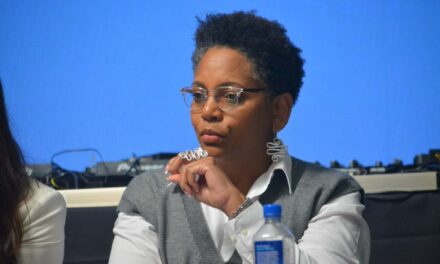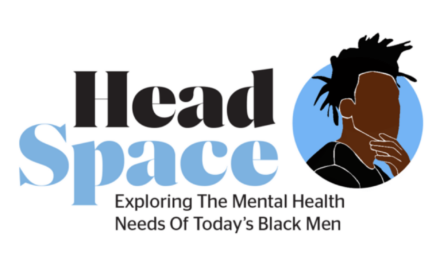Voices for Health Justice: Community Rally to Save Medicaid
At the Bakersfield American Indian Health Project on 501 40th Street, an impassioned gathering unfolded Wednesday as community members, advocates, and media converged to voice their concerns over proposed Medicaid cuts that threaten the health and livelihood of vulnerable populations. As Congress debates the future of healthcare funding, people from all walks of life—organizers, advocates, and those directly affected—came together to highlight the real-life consequences of slashing essential services.
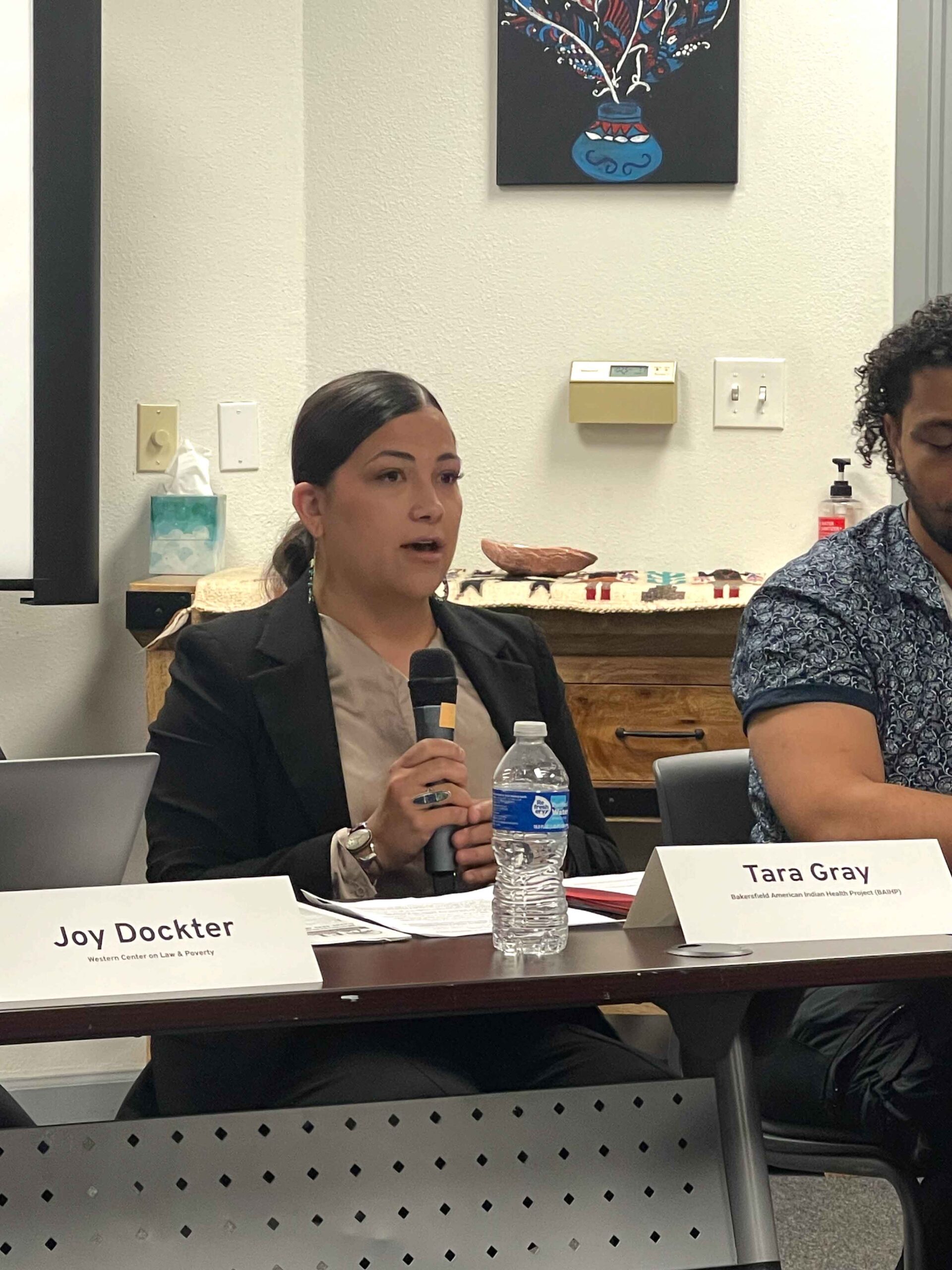
By Jason Land Jr.
“Future of Healthcare Hinges on Congressional Vote”
Bakersfield, CA – April 30, 2025 — At the Bakersfield American Indian Health Project on 501 40th Street, an impassioned gathering unfolded Wednesday as community members, advocates, and media converged to voice their concerns over proposed Medicaid cuts that threaten the health and livelihood of vulnerable populations. As Congress debates the future of healthcare funding, people from all walks of life—organizers, advocates, and those directly affected—came together to highlight the real-life consequences of slashing essential services.
In a resonant welcome, Sandy Close, Director of American Community Media, opened the event by thanking the Bakersfield American Indian Health Project for hosting and highlighting the importance of community voices in the fight for healthcare justice. She emphasized that the purpose of the day’s briefing was to bring together community media and local influencers to hear directly from individuals and advocates impacted by proposed Medicaid cuts. “This is a multi-partisan issue with all of us at stake,” Close declared. Citing the late Senator John McCain’s pivotal vote to preserve the Affordable Care Act, she reminded attendees that the future of Medicaid hinges on individual congressional votes. “District 22 has one of the highest per capita numbers of Medicaid enrollees in the country. That makes the vote of our representative even more critical,” she said. Close also acknowledged the essential role of community influencers and local media in shaping the public narrative, urging them to engage deeply, ask questions, and help share these urgent stories across platforms.
Throughout the day, a series of heartfelt personal testimonies unfolded.
Tara Gray, a Tribal Liaison with the Bakersfield American Indian Health Project, explained what Medicaid cutbacks would mean for the local community. She described the clinic’s essential role in providing behavioral and medical care to underserved populations. “If we lose our funds, our clients will have to travel hours to receive the care they desperately need,” she explained, highlighting the broader impact on Kern County residents beyond Native communities. Gray also discussed how Medicaid funding supports culturally competent care, preventative services, and mental health support—services that would be compromised if the proposed reductions move forward. “We are already working with limited resources. Taking more away would mean turning people away at the door,” she added.
Joy Dockter, a senior attorney with Western Center on Law & Poverty, provided a statewide perspective on the implications of proposed Medicaid reductions. She warned that “terminating health care through Medi-Cal for people who can’t get coverage anywhere else” would have dire consequences, pushing families deeper into poverty and creating chaos across the state’s healthcare system. “Congress is condemning them to less healthy, and less economically viable, lives,” she said. Dockter pointed to the impact on hospitals, clinics, and counties, especially in areas like California’s District 22, where over 65 percent of residents rely on Medicaid. “There is simply no way to cut Medicaid without also harming everyone, including children, seniors, people with disabilities, and pregnant women.”
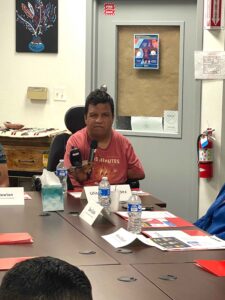
Ulises Hernandez, a person with disabilities
Ulises Hernandez, a person with disabilities, gave a deeply moving personal testimony. Diagnosed with TAR syndrome and reliant on a power wheelchair, he shared the challenges he faces daily navigating inaccessible infrastructure and his dependency on Medicaid-funded aides and therapies. “I would be devastated if these cuts go into effect,” he said. “Without Medicaid, my independence—and my life—would be at risk.” Hernandez also spoke to the psychological burden that comes with uncertainty in care access. “People like me are often forgotten. These services are not luxuries; they are lifelines.”
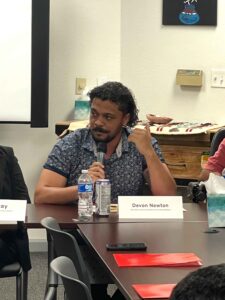
Devton Newton, a father and veteran EMT
Devton Newton, a father and veteran EMT, shared his experience as a caregiver for his son with a severe spinal cord defect. His testimony reflected the emotional and financial toll that would intensify if Medicaid is slashed. “How are we going to afford this?” he asked, echoing the worries of countless families facing similar realities. Newton described the extensive coordination it takes to manage home care, therapies, medical appointments, and school accommodations for his son. “When people say ‘cut the budget,’ I wonder if they’ve ever had to choose between rent and medical supplies. Because that’s what these cuts will mean for us.”
Dee Slade, Executive Director of the African American Network of Kern County, provided historical context to the rally, recalling how healthcare access has always been tied to broader civil rights struggles. “Start your historical journey,” she urged the crowd. “This isn’t new—this conversation has happened numerous times, and what’s always at the forefront is fear. Fear of the past. Fear of the present.” Slade reminded attendees that Medicare and Medicaid were signed into law during the civil rights movement and were hard-won victories for working families. “It is your right, as a citizen of the United States of America, to be the recipient of quality healthcare,” she said. Addressing Congressman David Valadao directly, Slade emphasized respectful but firm advocacy: “Call his staff. Make an appointment. Let him know your grievances. The people—the people—must speak, because when they do, representatives listen.”
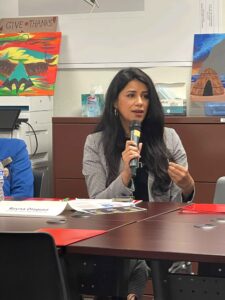
Reyna Olaguez, Executive Director of South Kern Sol and CEO of Building Healthy Communities Kern
Reyna Olaguez, Executive Director of South Kern Sol and CEO of Building Healthy Communities Kern, connected the Medicaid issue to broader systems of inequality. She emphasized how people in Kern County, especially in rural and immigrant communities, already face major healthcare challenges. “Kern County cannot afford to lose any healthcare—we already lack sufficient doctors, and we don’t have hospitals in rural communities,” she said. Olaguez shared personal stories, including how her mother died of diabetes at just 54 and how her father nearly lost his feet due to delayed care. “People with diabetes are now living longer thanks to our healthcare system. This is a critical time,” she added. “We’re not standing outside Congressman Valadao’s office to bother him—we’re here so he knows this matters to hundreds of thousands of people in Kern County.”
Angel Galvez, Chief Executive Officer of the Bakersfield American Indian Health Project, spoke from a deeply personal perspective, emphasizing the generational sacrifices made by Indigenous and working-class families to build a better future. “My father and mother worked very hard—they broke their backs—as I’m sure your mothers and forefathers did, to pave the way for you,” Galvez said. He stressed that communities like his continue to contribute to the nation’s well-being, including through taxes that help fund essential programs like Medi-Cal. Addressing Congressman David Valadao directly, Galvez added, “If he can be the friend he says he is… if he can be the man of his word, then I believe he will make the right decision for us and for everyone.” He called on Valadao to sit with the community, listen, and “assure us what his vote is going to be on that very day,” reminding everyone that all children—not just the privileged—deserve quality care.
As the session concluded, attention turned once again to the looming congressional timeline. Joy Dockter detailed the path ahead: behind closed doors, lawmakers were drafting proposals to determine the future of Medicaid, with key committee meetings set to begin May 7. From there, negotiations would intensify through June and July, with final budget resolutions expected before Congress breaks for recess in August. The urgency was unmistakable—this was the critical window for constituents to raise their voices, demand transparency, and advocate for their communities.
With a nod to history and a challenge to the present, Sandy Close, Director of American Community Media, offered final reflections. Quoting the Freedom’s Journal, the first Black-owned newspaper in the U.S., she declared, “We wish to plead our own cause. Too long have others spoken for us.” She emphasized the power of advocacy media to uplift community voices and shape the public narrative. “My first step when I get back to San Francisco,” she said, “is to call David Valadao and ask for an interview on behalf of American Community Media.” Her parting message was clear: the voices in the room—and in the stories told that day—must not only be heard but echoed across the state and up to Capitol Hill.
With heartfelt thanks to the speakers, attendees, and community reporters who came together for a shared purpose, the event ended not in silence, but in resolve. The call to action had been made. Now, it was time to answer.
Note: Every speaker is labeled with their name-tag other than CEO Angel Galvez. Email me or message me at 661-444-2541 if you have any questions.


